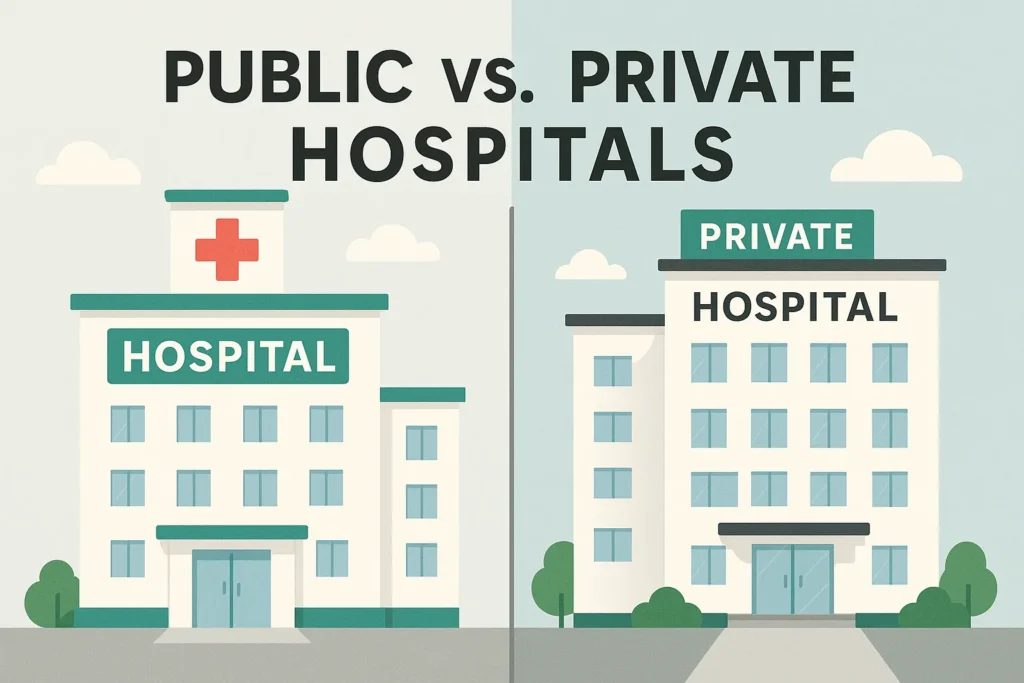Stepping into a new country always comes with a few questions, especially about healthcare. If you’re an expat settling in Indonesia or just passing through as a traveler, understanding the local medical system is key. Indonesia offers a mix of public and private healthcare options, and knowing the difference can make all the difference in your experience.

This guide will walk you through what to expect from public hospitals in Indonesia. We’ll cover everything from their setup to how they might compare to what you’re used to, helping you feel more prepared and confident during your stay.
You’re currently diving deep into the public hospital system in Indonesia. If you’re looking for a broader overview of all healthcare services in the country, including insurance, private facilities, and essential health tips, head over to our comprehensive guide: Indonesian Healthcare System: A Comprehensive Guide for Expats and International Travelers.
See Table of Contents
Public Healthcare in Indonesia: An Overview
Indonesia’s public healthcare system is quite extensive, with facilities ranging from small community clinics to large general hospitals. It’s designed primarily for Indonesian citizens, especially those covered by the national health insurance, BPJS Kesehatan.
Your First Stop: Puskesmas (Community Health Centers)
You’ll find Puskesmas in almost every neighborhood. Think of them as your local community clinic. They handle basic health checks, vaccinations, and general health advice. If you’re dealing with something minor, a Puskesmas might be able to help. However, for emergencies or more serious conditions, they’ll usually refer you to a hospital. For most foreigners, especially in urgent situations, a Puskesmas often isn’t the first choice due to their basic services.
The Main Network: Government Hospitals (RSUD/RSUP)
These are the larger public hospitals, found in regencies, cities, and provinces. They offer a wider range of services, including various specialists and surgical facilities. Public hospitals generally come with a more affordable price tag, particularly if you’re enrolled in BPJS Kesehatan.
However, there are a few things to keep in mind:
- Quality Can Vary: Hospital standards can differ a lot. While major cities like Jakarta and Bali might have decent public facilities, those in rural areas might have fewer resources.
- Long Waits: Be prepared for potential queues. Public hospitals can get very busy.
- Language Barrier: This is a big one for foreigners. Many doctors and staff might not speak English fluently, which can make communication tough when you’re trying to explain symptoms.
- Upfront Payments: If you don’t have BPJS Kesehatan, you’ll likely need to pay for services out of pocket.
BPJS Kesehatan for Foreigners: What You Need to Know
Indonesia’s national health insurance, BPJS Kesehatan, is mandatory for all citizens and also for certain foreign nationals.
Who Needs to Join?
If you’re an expat with a KITAS (Limited Stay Permit) or KITAP (Permanent Stay Permit) and working for an Indonesian company for six months or more, you’ll generally be required to register for BPJS Kesehatan. Your employer usually takes care of this.
The Referral System: A Key Feature
One important aspect of BPJS Kesehatan is its tiered referral system. This means you’ll usually need to visit a Puskesmas or a designated primary care clinic first. If they can’t handle your condition, they’ll refer you to a specialist or a hospital within the BPJS network. This process can sometimes take longer than you might expect.
Pros and Cons for Expats
While BPJS Kesehatan offers affordable contributions and broad coverage, the facilities under the public system might not always match international standards. This is why many expats, even those with BPJS, choose to have private international health insurance as well, for more direct access and higher-standard facilities.
Public vs. Private Hospitals: A Quick Comparison
Most expats and international travelers often opt for private hospitals and clinics in Indonesia. Here’s a brief look at why:
| Feature | Public Hospitals | Private Hospitals |
|---|---|---|
| Facilities | Simpler, varying quality; limited resources in rural areas | Modern, well-equipped, and usually cleaner |
| Wait Times | Potentially long | Shorter, more efficient |
| Staff Language | Mostly Bahasa Indonesia; limited English | More likely to have English-speaking staff |
| Cost | More affordable (especially with BPJS) | Higher cost; often requires upfront payment or direct billing with international insurance |
| Service Quality | Basic to moderate | Higher standard of care, more personalized |
Final Thoughts for Your Health in Indonesia
Understanding Indonesia’s public healthcare system is a valuable step. While it serves a crucial role for the local population, for many foreign nationals, especially those used to specific healthcare standards, exploring private options is often preferred for more seamless and comprehensive medical care.
For full peace of mind, particularly in emergencies or for specialized treatments, combining international health insurance with access to reputable private hospitals is highly recommended for your stay in Indonesia. Staying informed helps you make the best choices for your health abroad!
Official Resources:
- Ministry of Health of the Republic of Indonesia: https://www.kemkes.go.id
- BPJS Kesehatan: https://www.bpjs-kesehatan.go.id
- BNPB (National Disaster Management Agency): https://www.bnpb.go.id
- World Health Organization (WHO) Travel & Health: https://www.who.int/health-topics/travel-and-health
- Centers for Disease Control and Prevention (CDC) Travel: https://www.cdc.gov/travel
